Related Research Articles

Renata Tebaldi was an Italian lirico-spinto soprano popular in the post-war period, and especially prominent as one of the stars of La Scala, San Carlo and, especially, the Metropolitan Opera. Often considered among the great opera singers of the 20th century, she focused primarily on the verismo roles of the lyric and dramatic repertoires. Italian conductor Arturo Toscanini called her voice "la voce d'angelo", and La Scala music director Riccardo Muti called her "one of the greatest performers with one of the most extraordinary voices in the field of opera."

Renata Scotto was an Italian soprano, opera director, and voice teacher. Recognised for her sense of style, her musicality, and as a remarkable singer-actress, Scotto is considered to have been one of the preeminent opera singers of her generation.
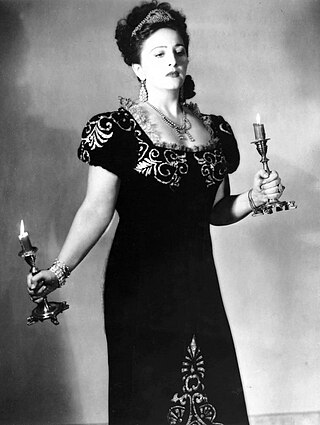
Zinka Milanov was a Croatian operatic dramatic soprano who had a major career centered on the Metropolitan Opera in New York City. After finishing her education in Zagreb, Milanov made her debut in 1927 in Ljubljana as Leonora in Giuseppe Verdi's Il Trovatore. From 1928 to 1936, she was the leading soprano of the Croatian National Theatre. In 1937, Milanov performed at the Metropolitan Opera for the first time, where she continued to sing until 1966. She also performed as a concert singer and was a noted vocal coach and teacher. Milanov is the sister of the composer and pianist Božidar Kunc.
Spinto is a vocal term used to characterize a soprano or tenor voice of a weight between lyric and dramatic that is capable of handling large musical climaxes in opera at moderate intervals.
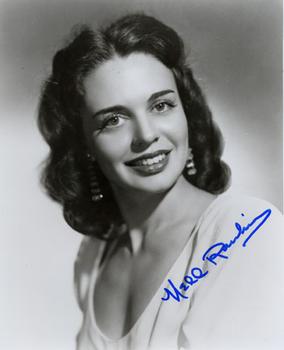
Nell Rankin was an American operatic mezzo-soprano. Though a successful opera singer internationally, she spent most of her career at the Metropolitan Opera, where she worked from 1951 to 1976. She was particularly admired for her portrayals of Amneris in Verdi's Aida and the title role in Bizet's Carmen. Opera News said, "Her full, generous tone and bold phrasing, especially in the Italian repertory, were unique among American mezzos of her generation.

La Gioconda is an opera in four acts by Amilcare Ponchielli set to an Italian libretto by Arrigo Boito, based on Angelo, Tyrant of Padua, a 1835 play in prose by Victor Hugo.
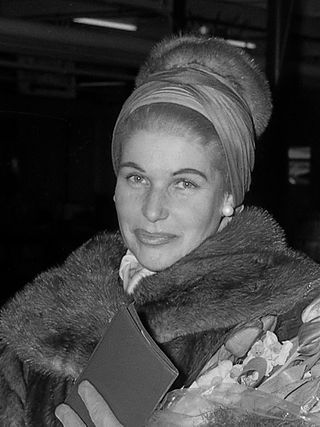
Hilde Güden was an Austrian soprano who was one of the most appreciated Straussian and Mozartian sopranos of her day. Her youthful and lively interpretations made her an ideal interpreter of roles such as Zerbinetta in Ariadne auf Naxos and Susanna in Le nozze di Figaro.

Tullio Serafin was an Italian conductor and former Musical Director at La Scala.

Lamberto Gardelli was a Swedish conductor of Italian birth, particularly associated with the Italian opera repertory, especially the works of Giuseppe Verdi.

Mercedes Llopart was a Spanish soprano who later became a notable singing teacher in Italy.

Carmen Melis was an Italian operatic soprano who had a major international career during the first four decades of the 20th century. She was known, above all, as a verismo soprano, and was one of the most interesting singing actresses of the early 20th century. She made her debut in Novara in 1905 and her career rapidly developed in her native country over the next four years. From 1909 to 1916 she performed with important opera companies in the United States; after which she was busy performing at many of Europe's most important opera houses. From 1917 until her retirement from the stage in 1935 she was particularly active at the Teatro Costanzi in Rome and at La Scala in Milan. After her singing career ended, she embarked on a second career as a voice teacher. Her most notable student was soprano Renata Tebaldi.
Daniele Barioni was an Italian opera singer who had a prolific career during the 1950s through the 1970s. Early on in his career he rose to fame as a leading tenor at the Metropolitan Opera between 1956 and 1962. Afterwards he worked primarily in opera houses and concerts throughout the United States, although he did make numerous appearances in both Europe and South America as well. Barioni was particularly associated with the operas of Giacomo Puccini and the roles of Turiddu in Pietro Mascagni's Cavalleria rusticana and Alfredo in Giuseppe Verdi's La traviata.
Alberto Erede was an Italian conductor, particularly associated with operatic work.
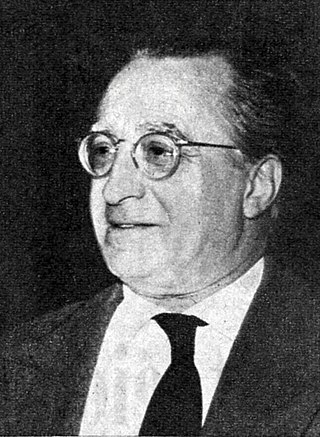
Franco Capuana was an Italian conductor.

Gianni Poggi was an Italian tenor, particularly associated with the Italian repertory.
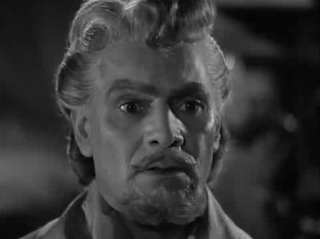
Afro Poli was an Italian operatic baritone, particularly associated with the Italian repertory.

Licinio Refice was an Italian composer and priest. With Monsignor Lorenzo Perosi he represented the new direction taken by Italian church music in the twentieth century, and he left the popular song Ombra di nube (1935) as well as two completed operas.
Marta Pérez Suárez was a Cuban-American mezzo-soprano and the first Cuban woman to sing in Milan's famed La Scala opera house in 1955.

Maria Luigia Borsi is an Italian opera singer. A lyric soprano, she is especially known for interpreting operas by Giacomo Puccini and Giuseppe Verdi. Among the qualities noted by the critical press are her breath control, phrasing, rich tone, and acting ability.
"O soave fanciulla" is a romantic duet from the first act of Giacomo Puccini's 1896 opera La bohème. It is sung as the closing number in act 1 by Rodolfo (tenor) and Mimì (soprano) where they realise they have fallen for each other.
References
- ↑ David Mason Greene · Greene's Biographical Encyclopedia of Composers 1985 - Page 1149 "... opera Cecilia, completed in 1923 but not produced until 1934 (in Rome). Various prime donne, beginning with Claudia Muzio and including the Renatas Tebaldi and Scotto, have continued to use it as a showcase for their talents."
- ↑ Review